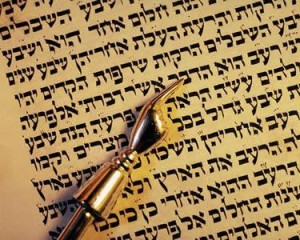This week’s Torah portion is “Pinchas” (Numbers 25:10–30:1), named after the hero of the reading.
By: Rabbi Ari Enkin, Rabbinic Director, United with Israel
For those who like stats, this week’s Torah portion is made up of 7,853 Hebrew letters, 1,887 Hebrew words and 168 verses, and it occupies about 280 lines in a Torah scroll. While the story of Pinchas, the zealot for the glory of God, is a prominent event in the reading, we are going to focus on another item of interest: the daily sacrifice.
Indeed, this week’s reading contains an entire list of the different sacrifices that were offered in the Holy Temple. The daily sacrifice, however, was a sacrifice that was offered every single morning and every single afternoon of the year. Sabbath, holidays Yom Kippur…no exceptions. As the verse says: “One Lamb is to be offered in the morning and one Lamb is to be brought toward the evening.”
Routine. Consistency. While there may be much benefit in having a daily routine, there are some drawbacks as well.
Let’s examine another verse related to the daily offering. The Torah comments that the daily sacrifice was a “continual burnt offering which was made at Mount Sinai for a pleasant aroma, a fire offering, before the Lord.”
Huh?
What does the sacrifice on Mount Sinai have to do with the daily sacrifice in Jerusalem?
No matter how special or worthwhile something may be, when it is done routinely, day in and day out, it eventually goes on “autopilot” – losing any personal touch. It becomes automatic without much thought. Robotic.
Think about it. Every day we wake up, head to the same bathroom to brush the same teeth (usually using the same toothpaste), then we head to the kitchen, make the same cup of coffee, eat what is usually the same breakfast…and the list goes on. Observant Jews stick in the morning prayers, including the donning of the tallit (prayer shawl) and tefillin (prayer boxes), somewhere in this list.

Torah observance must remain exciting, says UWI rabbinic director.
Remember the first time you put on tefillin? Or a tallit? Or lit Sabbath candles? Wasn’t it special? Wasn’t it spiritual? Different? Meaningful? But what usually happens after a short while is that the act loses its freshness and excitement.
Perhaps this is why the Torah inserts “a continual burnt offering which was made at Mount Sinai for a pleasant aroma, a fire offering, before the Lord.” Perhaps it is a reminder – to recall the first time! Remember how you felt! Remember the experience, the excitement, the enthusiasm!
The Torah is telling us that one should perform a mitzvah (commandment) as if it had been given on Mount Sinai that very day! In fact, we recite in the Shema 3+ times a day: “These things [mitzvot] that I command you THIS DAY shall be on your heart,” What? Was the Torah given today? Of course not. But perform the mitzvot as if it was.
This is how we should approach all daily routines, especially Torah observance and mitzvot. Pretend you are experiencing it for the first time, as if you were at Mount Sinai.
This is the message of the offering that was brought every single day in the Holy Temple.
Make sure not to let your daily routine, and especially your spiritual observance, become bland and robotic. Always try to make it exciting and refreshing!
Do You Love Israel? Make a Donation - Show Your Support!
Donate to vital charities that help protect Israeli citizens and inspire millions around the world to support Israel too!
Now more than ever, Israel needs your help to fight and win the war -- including on the battlefield of public opinion.
Antisemitism, anti-Israel bias and boycotts are out of control. Israel's enemies are inciting terror and violence against innocent Israelis and Jews around the world. Help us fight back!


